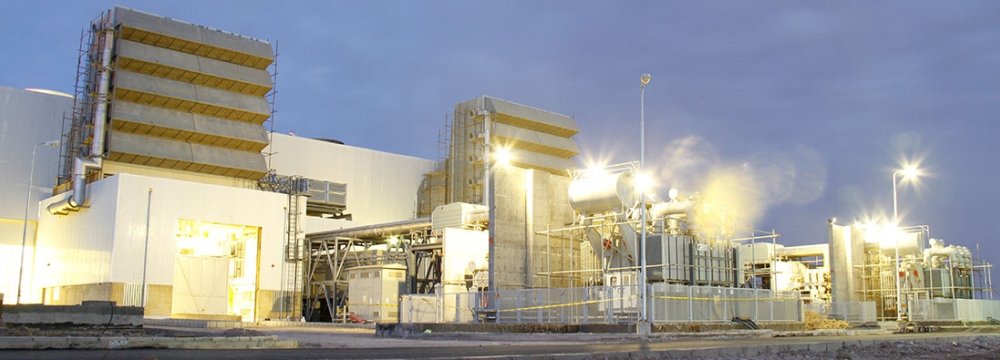
MAPNA-Built Power Plant in Basra to Start Partial Output

A power plant in the southern Iraqi city of Basra that is being built in cooperation with Iran's MAPNA Group will partially come on stream in the Iranian fiscal year that starts next March, Abbas Aliabadi, the group's managing director said.
MAPNA signed a $2.5 billion contract last year with Shamara Group, an Iraqi consortium of 14 industrial and energy companies, to build a 3,000-megawatt power plant in Basra, known as Rumaila Combined-Cycle Power Plant, in four years.
"We are now installing two (gas) turbines in the Rumaila plant which will start power generation next year," Aliabadi said without elaborating on the time of inauguration, ILNA reported.
The combined-cycle power plant, which will consist of 12 gas turbines and six steam turbines, is named after Iraq's super giant Rumaila Oilfield near the Kuwaiti border.
The official added that the power project has four phases. "The Rumaila power plant is the biggest technical project in the Middle East which will increase Iraq's total power generation capacity by 20%."
Combined-cycle power plants normally use both gas and steam turbines to produce up to 50% more electricity from the same fuel than traditional units.
In the first step, gas turbines are to be installed and integrated with Iraq's power grid, and then the steam units will be installed, according to a statement on MAPNA's website.
The government in Baghadad has given guarantees that it will purchase electricity from Rumaila for 15 years as per the contract.
MAPNA Group is a conglomerate of Iranian companies involved in development and execution of thermal and renewable power, oil and gas, railroad transportation and other industrial projects as well as manufacturing equipment.
The deal with the Iraqis was signed in July 2015, shortly after Iran and the six world powers (the five permanent members of the United Nations Security Council plus Germany) announced a historic agreement on scaling back international sanctions against Tehran in exchange for curbs on its nuclear program.
MAPNA supplies equipment, including gas and steam turbines and boilers besides engineering and supervising the project.
It has implemented power projects in Iraq in the past, namely the construction of a power plant in Najaf and the Al-Sadr Gas Power Plant in Baghdad.
The 3,000 MW power plant is expected to ease electricity shortage in the war-torn Arab country which is fighting an insurgency led by the so-called Islamic State. The terrorist group has seized swathes of land in Iraq's northern regions since 2013.
The Iraqi people have frequently taken to the streets in recent years to protest at poor public facilities and services, including day-long power outages in Baghdad and other cities that exacerbate in summer when demand for electricity to power cooling systems in the sweltering summer of above 50 degrees Celsius hits peak levels.


Trump weighs using $2 billion in CHIPS Act funding for critical minerals

Codelco cuts 2025 copper forecast after El Teniente mine collapse

Electra converts debt, launches $30M raise to jumpstart stalled cobalt refinery

Barrick’s Reko Diq in line for $410M ADB backing

Abcourt readies Sleeping Giant mill to pour first gold since 2014

Nevada army depot to serve as base for first US strategic minerals stockpile

SQM boosts lithium supply plans as prices flick higher

Viridis unveils 200Mt initial reserve for Brazil rare earth project

Tailings could meet much of US critical mineral demand – study

Kyrgyzstan kicks off underground gold mining at Kumtor

Kyrgyzstan kicks off underground gold mining at Kumtor

KoBold Metals granted lithium exploration rights in Congo

Freeport Indonesia to wrap up Gresik plant repairs by early September

Energy Fuels soars on Vulcan Elements partnership

Northern Dynasty sticks to proposal in battle to lift Pebble mine veto

Giustra-backed mining firm teams up with informal miners in Colombia

Critical Metals signs agreement to supply rare earth to US government-funded facility

China extends rare earth controls to imported material

Galan Lithium proceeds with $13M financing for Argentina project

Kyrgyzstan kicks off underground gold mining at Kumtor

Freeport Indonesia to wrap up Gresik plant repairs by early September

Energy Fuels soars on Vulcan Elements partnership

Northern Dynasty sticks to proposal in battle to lift Pebble mine veto

Giustra-backed mining firm teams up with informal miners in Colombia

Critical Metals signs agreement to supply rare earth to US government-funded facility

China extends rare earth controls to imported material

Galan Lithium proceeds with $13M financing for Argentina project

Silver price touches $39 as market weighs rate cut outlook

















